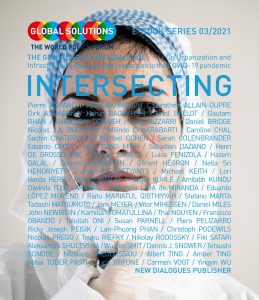
With articles and impressive original photographs from around the globe, the project INTERSECTING illustrates why sustainable new infrastructure is key to building resilient societies and preventing future pandemics. The e-book is a project of The Global Solutions Initiative (GSI) in cooperation with Deutsche Gesellschaft für Internationale Zusammenarbeit (GIZ) and New Dialogues as publisher. It can be downloaded on the GSI website.
Berlin, March 30th, 2021 – One year after the COVID-19 pandemic started, a new e-book features ideas and experiences from all over the world on how societies could prevent similar cascading disruptions in social, economic, political and institutional life in the future. More than 100 authors from all continents contributed to the project, which is entitled “INTERSECTING”. In over 50 contributions, they call to team up and create the
infrastructure of a new sustainable economy.
Richly illustrated by dozens of original photographs, INTERSECTING is an epic journey from ‘disease’ to multilateral ‘agendas’. It portrays a major crisis of the urban age. Beyond the pandemic, this era is also one of profound change and geopolitical shifts. All this calls for the voices of cities and citizens to be heard. The Global Solutions Initiative and GIZ have launched INTERSECTING. The Asian Development Bank Institute (ADBI) and the Organization for Economic Cooperation and Development (OECD) are knowledge partners. INTERSECTING is now available as an e-book in PDF format free of charge on the Global Solutions Initiative website. It is edited and illustrated by Nicolas J.A. Buchoud, fellow of the Global Solutions Initiative, Holger Kuhle, policy advisor for strategic knowledge partnerships at GIZ, and Gunnar Hartmann, founder of New Dialogues and publisher of INTERSECTING.
“The world was caught off-guard by the pandemic, as it ignored many risk warnings. INTERSECTING is a concrete illustration of what teaming up beyond borders and spheres of expertise can reach. Such cooperation allowed the rapid sequencing of the SARS-CoV-2 genome and kick–started the development of vaccines. It should now also be applied to policy-making”, said Nicolas J. A. Buchoud.
“INTERSECTING, echoes the Elinor Ostrom’s legacy, the first woman to win the Nobel prize in economics. The book makes several proposals regarding health and infrastructure, how local and global investments can support inclusion and redistribution, how rebuilding social capital can get us prepared to solve future crises, and more,” Holger Kuhle explained.
Addressing the broad community of public and private decision–makers, researchers, practitioners, and young leaders gathered by the Global Solutions Initiative, INTERSECTING will be distributed by ADBI in Tokyo and by the Observatory on Latin America (OLA) of the New School in New York. In light of the G20 Summit, which will take place in Rome in October, the book will be extended with additional articles as well as updated. “The book reflects Dennis Snower’s call to ‘chart a new course for digital governance’ and to rebuild multilateral institutions and partnerships. Recovering from the pandemic should help address the many imbalances of our interconnected planet to redevelop public goods,” Markus Engels, Secretary-General of the Global Solutions Initiative, outlines.
The e-book comprises 310 pages. It is available for free download at https://www.global-solutions-initiative.org/publications/e-book-intersecting/
Note to the editors:
Most of the images from INTERSECTING are available for media publication. Please get in touch with us if you are interested.
Press Contact
Christoph Podewils, Director of Communications
+49-172-4497959
christoph.podewils@global-solutions-initiative.org
press@global-solutions-initiative.org
